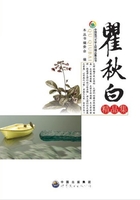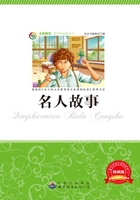THE SPIDER
OLIVER GOLDSMITH,who lived from 1731to 1774,was a celebrated poet.Though born and educated in Ireland,he spent most of his life in London,writing for his daily bread.The Traveler ,The Deserted Village ,The Vicar of Wakefield,and his Animated Nature,are among his principal works.
1.ANIMALS in general are sagacious in proportion as they cultivate society.The elephant and the beaver show theOliver Goldsmithgreatest signs of this,when united;but when man intrudes into their communities,they lose all their spirit of industry,and testify but a very small share of that sagacity for which in a social state they are so remarkable.
2.Among insects,the labors of the bee and the ant have employed the attention and admiration of the naturalist;but their whole sagacity is lost upon separation,and a single bee or ant seems destitute of every degree of industry,is the most stupid insect imaginable,languishes for a time in solitude,and soon dies.
3.Of all the solitary insects I have ever remarked,the spider is the most sagacious,and its actions,to me,who have attentively considered them,seem almost to exceed belief.The insect is formed by nature for a state of war not only upon other insects,but upon its own kind.
For this state,nature seems perfectly well to have formed it.Its head and breast are covered with a strong natural coat of mail,which is impenetrable to the attempts of every other insect,and its abdomen is enveloped in a soft pliant skin,which eludes the sting even of a wasp.Its legs are terminated by strong claws,not unlike those of a lobster;and their vast length,like spears,serves to keep every assailant at a distance.
4.Not worse furnished for observation than for attack or defense,it has several eyes,large,transparent,and covered with a horny substance,which,however,does not impede its vision.Besides this,it is furnished with a forceps above the mouth,which serves to kill or secure the prey already caught in its claws or its net.
5.Such are the implements of war with which the body is immediately furnished;but its net to entangle the enemy seems what it chiefly trusts to,and what it takes most pains to render as complete as possible.Nature has furnished the body of this little creature with a glutinous liquid,which it spins into thread coarser or finer,as it chooses to contract or dilate the opening through which it comes.In order to fix its threads when it begins to weave,it emits a small drop of its liquid against the wall,which hardening by degrees,serves to hold the thread very firmly.Then receding from the first point,the thread lengthens,and when the spider has come to the place where the other end of the thread should be fixed,gathering up with its claws the thread,which would otherwise be too slack,it is stretched tightly,and fixed in the same manner to the wall as before.
6.In this manner it spins and fixes several threads parallel to each other,which,so to speak,serve as the warp to the intended web.To form the woof,it spins in the same manner its thread,transversely fixing one end to the first thread that was spun,and which is always the strongest of the whole web,and the other to the wall.All these threads being newly spun,are glutinous,and therefore stick to each other,wherever they happen to touch;and in those parts of the webmost exposed to be torn,our natural artist strengthens them,by doubling the threads sometimes six-fold.
7.Thus far,naturalists have gone into the deion of this animal:what follows is the result of my own observation upon that species of the insect called the house spider.I perceived,about four years ago,a large spider in one corner of my room,making its web,and though the maid frequently leveled her fatal broom against the labors of the little animal,I had the good fortune then to prevent its destruction,and,I may say,it more than paid me by the entertainment it afforded.
8.In three days,the web was with incredible diligence completed;nor could I avoid thinking that the insect seemed to exult in its new abode.It frequently traversed it round,and examined the strength of every part of it.The first enemy,however,it had to encounter,was another and a much larger spider,which,having no web of its own,and having probably exhausted all its stock in former labors of this kind,came to invade the property of its neighbor.Soon,then,a terrible encounter ensued,in which the invader seemed to have the victory,and the laborious spider was obliged to take refuge in its hole.Upon this,I perceived the victor using every art to draw the enemy from his stronghold.He seemed to go off,but quickly returned,and when he found all arts vain,began to demolish the new web without mercy.This brought on a new battle,and,contrary to my expectations,the laborious spider became conqueror,and fairly killed his antagonist.
9.Now then,in peaceful possession of what was justly its own,it waited three days with the utmost impatience,repairing the breaches of its web,and taking no sustenance,that I could perceive.At last,however,a large blue fly fell into the snare,and struggled hard to get loose.The spider gave it leave to entangle itself as much as possible,but it seemed to be too strong for the cobweb.I must own I was greatly surprised when I saw the spider immediately sally out,and in less than a minute weave a new net around its captive,by which themotion of its wings was stopped;and when it was fairly hampered in this manner,it was seized and dragged into the hole.















